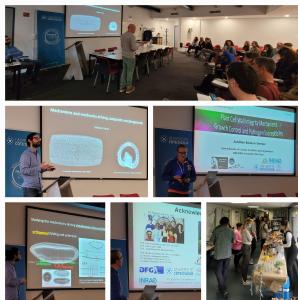Académie d'Excellence "Complexité et diversité du vivant"
3rd Academy 4 Research Webinar - Brain, Obesity & Morphometrics - May 18th, 2021
- Research
- IDEX
on the May 18, 2021
Online

It is our pleasure to announce the Academy 4 Research Webinars on Bio-Medical & Transdisciplinary Topics.
They take place every 3rd Tuesday of the Month.
The 3rd session took place online on the 18th of May 2021 at noon (12 PM). The video recording of the webinar is here.
PROGRAM : "BRAIN, OBESITY & MORPHOMETRICS"
INVITED SPEAKER:
Clara SANCHEZ, Assistant lecturer Université Côte d'Azur, PhD student, affiliated with IPMC CNRS, Team GENE - Genomics & Evolution in Neuro-Endocrinology (https://www.ipmc.cnrs.fr/cgi-bin/site.cgi).
Title: Effect of a Sunflower oil enriched diet on microglial reactivity, neuroinflammation and cognitive disorders associated with obesity.
Abstract: Obesity, the fifth leading global risk factor for mortality, is a serious public health problem. It is associated with “low-grade” systemic inflammation and many studies are devoted to understand the mechanisms causing obesity. Some of them showed that deregulation in the brain could be responsible for this syndrome. In addition to the peripheral inflammation, a local hypothalamic inflammation was found in obese animals fed a high fat diet (HFD), leading to eating disorders and sometimes cognitive disorders as anxiety. More specifically, certain lipids are responsible for this inflammation and the degree of hypothalamic inflammation induced by these lipids depends on the quality of their fatty acids. Polyunsaturated fatty acid (PUFA) can be Omega 6 or Omega 3 and the balance between them is really essential for the organism functioning. At the cellular level, an excess of nutrients leads to activation of astrocytes and microglia which have a preventive role at first but can become harmful in the long term and lead to deregulation in the functioning of the brain.
The purpose of this study was to characterize the impact of a HFD enriched in Omega 6 on the obesity development, the neuroinflammation associated and the cognitive disorders that could be triggered. To do this, we designed two HFD enriched in vegetal oil and PUFA to modulate their Omega6/Omega3 ratios. Soybean/Corn diet with a preconized Omega6/Omega3 ratio of 7 and Sunflower diet with harmful Omega6/Omega3 ratio of 21. We fed mice over 20 weeks with both HFD and we characterized obesity development, neuroinflammation and behavior of mice. We showed that both diets induce a strong weight gain associated with hyperleptinemia, hyperglycemia and deregulated glucose homeostasis. However, only the Sunflower diet induces a neuroinflammation in hypothalamus (feeding behavior control) associated with microglial reactivity and in hippocampus (implicated in anxiety) associated with hyperactivity and anxiety-like behavior. On the computational side, we are developing an image analysis procedure to automatically measure, i.e. in a reliable and investigator independent manner, the changes in the morphology of astrocytes and microglial cells to determine the degree of cell activation by fat diets. This objective is decomposed into three main steps: (i) development of specific image processing tools and pipelines to automatically detect glial cells (ii) characterization of these detected objects by means of so-called features, and (iii) analysis of these data using machine learning.
To sum up, we show that weight gain and obesity are not influenced by the nature of the fatty acids but that neuroinflammation, microglial reactivity, and cognitive impairment are indeed influenced by the Omega6/Omega3 ratio of an HFD.
Key words: Lipids, Fat diets, Obesity, Hypothalamus, Neuroinflammation, Glial cells, Microglial reactivity, Image analysis, Morphometric tool.
QUESTIONS & DISCUSSION SUPPORT:
Eric DEBREUVE, PhD, Research Scientist CNRS, affiliated with laboratory I3S, Team MORPHEME - Morphology & Images.
https://www.i3s.unice.fr/~debreuve/
Related Publications:
1- Cansell C, Stobbe K, Sanchez C, Le Thuc O, Mosser CA, Ben-Fradj S, Leredde J, Lebeaupin C, Debayle D, Fleuriot L, Brau F, Devaux N, Benani A, Audinat E, Blondeau N, Nahon J-L, Rovère C.
Dietary fat exacerbates post-prandial hypothalamic inflammation involving GFAP-positive cells and microglia in male mice. Glia. 2021. DOI: 10.1002/glia.23882.
2- Nuzzaci D, Cansell C, Liénard F, Nédélec E, Ben Fradj S, Castel J, Foppen E, Denis R, Grouselle D, Laderrière A, Lemoine A, Mathou A, Tolle V, Heurtaux T, Fioramonti X, Audinat E, Pénicaud L, Nahon J-L, Rovère C, Benani A.
Postprandial hyperglycemia stimulates neuroglial plasticity in hypothalamic POMC neurons after a balanced meal. Cell Rep 2020 . DOI: 10.1016/j.celrep.2020.02.029.
Funds: CNRS and Academies of Excellence 4 -“Complexity and diversity of Living Systems”, 3-“Space, Environment, Risks and Resilience” & 2-“Complex Systems” of IDEX JEDI Université Côte d'Azur (ANR-15-IDEX-01).
ORGANIZERS:
Academy of Excellence 4 "Complexity & Diversity of the Living Systems"
Academy of Excellence 5 "Human Societies, Ideas and Environments"
Graduate School and Research HEALTHY - Health Science Ecosystems
Graduate School and Research LIFE - Life and Health Sciences
Institute NeuroMod - Cognitive Systems, Normality and Pathology of the Human Brain and Computational Neurosciences
Labex SIGNALIFE - Network for Innovation on Signal Transduction Pathways in Life Sciences




















